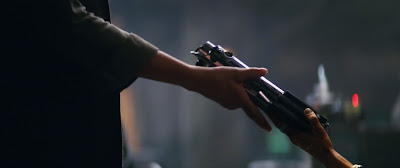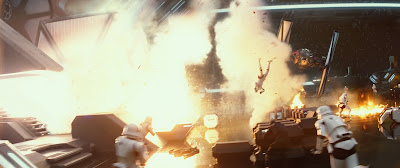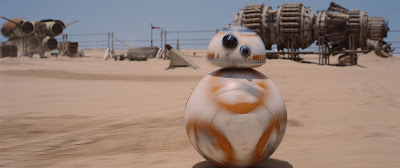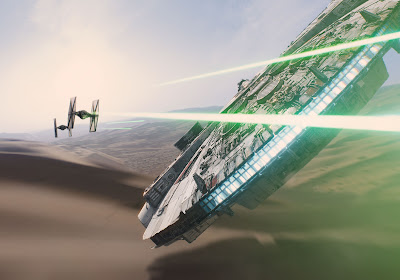-I liked The Force Awakens a lot
-I liked Rogue One well enough
-Rebels has been pretty good overall
-I loved The Last Jedi
Now then, on to my actual post. Spoilers galore, obviously.
One of the things that ceaselessly impresses me about The Last Jedi is its deep focus on character. Every major character in the film, save for maybe Leia, has a notable arc.
Star Wars saga films are known for their arcs, of course, but they tend to be very surface-level, and nearly always focused on the idea of Light versus Dark. What's really powerful, though, and what makes the stories work even better, is when the characters get nuanced.
All of us grow and change as we mature; we all "arc." But most of us don't arc from hero to villain or vice versa. Real, human "arcs" involve us learning deeper truths about ourselves, the world, the universe, etc. Here's some examples of relatable, truthful character arcs:
-An egotistical boy is faced with failure and thus learns humility
-A girl who has been hurt in the past learns to let go of pain in order to move forward in life
-A man learns to let go of guilt over past mistakes
-A woman takes charge of her identity by rejecting the labels others have placed upon her
If one of these more human arcs also functions as an arc between light and dark (or good and evil), great. But light and dark in and of themselves are rather abstract concepts. This is why Anakin Skywalker's arc in the Prequels doesn't feel true. Anakin is pulled to the dark side because... he just is. There are some implications of fear and pride, but they ultimately still don't build up enough to justify child murder in Revenge of the Sith.
Luke Skywalker, on the other hand, has the most notable arc in the first six films of the saga, not because he arcs between light and dark (because he doesn't), but because he has real, honest growth. In A New Hope, he goes from naive boy to courageous hero, and by the time of The Empire Strikes Back, he's grown a sense of confidence—not realizing that in many ways, he's as naive as he ever was. In the end of Empire, Luke discovers that the universe is much more complicated than he ever thought. He can't simply rush in and defeat Darth Vader, saving his friends and avenging his father, because Vader is his father. Furthermore, Luke is faced with the reality that simply having a strong connection to the Force isn't always an instant-win button, and he pays for his overconfidence with his hand. By the time of Return of the Jedi, Luke has been forced to reevaluate his life. Instead of playing at being warrior hero, Luke offers a hand of mercy to someone who doesn't deserve it. This compassion-based decision is both a new action Luke takes in ROTJ as well as something that's completely in line with who Luke is in the beginning of A New Hope: Luke Skywalker thinks with his heart. The difference between Luke in ANH and Luke in ROTJ is that Luke takes the lessons he's learned and uses them alongside his heart in order to discover a truth that everyone else missed: that although light and dark both exist, people are rarely that simple. People are people, and people are complicated.
So how does this work in The Last Jedi? How do characters arc? Let's go down the list.
Finn:
Finn wakes up in The Last Jedi apparently having been in a coma since his duel with Kylo Ren in the forest. As such, he hasn't changed one bit since then. In The Force Awakens, Finn ran from the First Order, seemingly caring only about his own life and the life of his crush, Rey. In fact, he lies to the Resistance in TFA, telling them that he can shut down Starkiller Base's shields, when in fact he only wants to save Rey and leave again. In The Last Jedi, he once again tries to leave the Resistance high and dry, just to save his own skin and Rey's. However, this begins to change once he meets Rose.
Rose is the personification of every quality that Finn lacks. Rose's sister has recently died fighting for the Resistance, and Rose understands the larger societal evils that the Resistance is fighting against. Finn apparently never saw anything outside of a First Order ship or base until the attack on the Jakku village, so he has no real context for why the Resistance are fighting aside from for their own survival. Furthermore, Finn's only real strong emotional connection at this point is Rey, who, throughout TFA, was also only out for her own survival—at least until she leaves to find Luke, which Finn wasn't there to witness. Finn's adventure with Rose is the first time he's ever spent a large amount of time with someone with a motivation larger than herself. He's friends with Poe, yes, but they don't actually spend much time together—and Poe has his own problems, which I'll get to in a minute. When Finn and Rose travel to Canto Bight, Finn begins to see the effect that war and corruption have on the peoples of the galaxy. War profiteers laugh and enjoy themselves while spending the money they made selling the very weapons that are currently killing the Resistance members in another part of the galaxy. Oh, and they own child slaves, too, if that wasn't enough. Finn's arc may also be influenced by the betrayal of DJ, who is literally nicknamed for his motto, "don't join," which could also be interpreted as "only side with yourself" and "don't believe in a cause."
Later on Crait, Finn finally decides that his life is worth sacrificing for the sake of others. Not just for someone he specifically cares about (these are the same people he tried to ditch earlier, after all), but for the cause; for what's right. But he still needs one more correction from Rose: it's not about destroying what you hate; it's about protecting what you love. Neat little thing: Rose's theme in the soundtrack is basically a gentler, feminine version of Luke Skywalker's theme, AKA the Star Wars main title. Rose represents the heroic, uplifting spirit of Star Wars, and she's exactly what Finn needed.
-Rose symbolizes the best of what Finn could be
-DJ represents the worst of what Finn could be
-Finn chooses to be more like Rose
Rose:
This one is short, because Rose doesn't really arc, per se. She does, however, learn an arc-type lesson. She lands on Canto Bight believing that the super-rich are intrinsically evil and deserving of scorn. She learns from DJ, however, that the weapons dealers may be more accurately morally-gray (at least from DJ's perspective), and that they sell weapons to the Rebellion and Resistance as well. It figures that the one flaw of Rose's character would be the one part of herself that's focused on hate.
Poe:
Poe's arc is pretty straightforward: Poe believes that he is the hero of the story; that he can jump in an X-Wing and destroy whatever he needs to in order to win the day, and that all the Resistance needs to do to win is fight harder. He's wrong, of course, and after finding out he's been a prideful idiot, he takes a step back (ironically a step forward?), learning how to be a leader rather than a hero.
Ben / Kylo Ren:
Kylo's arc is actually less internal and more external. He's being held back in his growth, both by Snoke and by himself.
Kylo Ren has been defined by his obsession with Darth Vader to an unhealthy degree. In The Force Awakens, Rey senses that this is a point of fear and inadequacy for Kylo. The helmet Kylo wears is a feeble attempt to imitate Darth Vader, and when Snoke makes Kylo take it off in the beginning of TLJ, Kylo's shell begins to crack, as he's metaphorically forced to become more defined by his own persona than by his grandfather's example.
Snoke believes that Ben is powerful, but ultimately controllable and predictable, and he tells Ben as much. Furthermore, we learn that Snoke has been purposely unbalancing Ben's mind, merely for the purposes of tempting Rey. Ben takes Snoke's manipulative telepathy, however, and turns it around, tricking Snoke instead. With Ben now free of Snoke, he's able to forge his own destiny and be his own man. This is a huge step up from the beaten-down wannabe that Kylo Ren was at the end of TFA; now Kylo Ren is the supreme leader of the First Order. In this sense, Kylo has actually gone further and accomplished more than Darth Vader ever did. Now he can actually pursue Anakin's dream of building a new Empire, no longer under another dark lord's shadow.
Rey:
Near the beginning of The Last Jedi, Luke asks Rey, "why are you here?"
Although Rey has decided to stop waiting for her family to return to Jakku, she doesn't necessarily have a path forward yet, and still thinks of the universe in simple black-and-white emotional terms. Still using a survivor's mindset, she continually refers to things in utilitarian terms. She gets angry with Luke for not teaching her the things she needs to know, or coming back with her to do what she thinks he needs to do. She reaches out to the Dark Side not out of anger or hate, but because she's looking for simple answers, not realizing that there are none to be had.
Furthermore, once she realizes the difference between the light side and the dark, she naively thinks that she can simply turn Ben back to the light as Luke did Anakin. She's learned the lesson that Luke learned in Return of the Jedi—that people are complicated—but she still lacks the full understanding of what that means, and she's still thinking in absolutes. When she teams up with Ben in the throne room, she assumes that because Ben turned against Snoke, it means he's on the side of good now—but she never considered the idea that Ben could simply be on his own side. And when Kylo Ren, as supreme leader, offers Rey the chance to join him, Rey knows that there's no way she can. Rey now understands on a personal level what Kylo Ren and the First Order stand for, and she has a reason for helping to build the new Rebellion at the end.
Luke:
This is the big one. It's a little tricky, since a lot of Luke's arc happens off-screen in-between trilogies. But it begins from a place of deep, understandable guilt.
One of the defining moments in Star Wars is Luke coming across the burning Lars homestead. He sees his home and family in a smoldering ruin and immediately knows that he must fight the Empire to prevent this from happening ever again. In the flashbacks of The Last Jedi, Luke once again sees his home on fire, the people he cares for dead—and this time it's his fault.
Luke had one moment of doubt, one moment of considering evil—just as he did in Return of the Jedi, holding his saber over a defeated Darth Vader—and paid for it dearly. Luke's new Jedi order was destroyed and his nephew became a dark threat to the galaxy.... none of which would have happened if Luke had never tried in the first place. From a certain point of view, Luke has now caused the same evil he fought so hard to stop in the Original Trilogy. So, out of guilt and anguish, Luke stopped trying. Once again, Luke Skywalker thinks with his heart.
Yoda, however, tells Luke that he must learn from his failures, pass on that knowledge to others, and, essentially, forgive himself. Luke has always been compassionate and forgiving towards others, but forgiving oneself is often one of the hardest lessons to learn. Yoda's tells Luke, "we are what they grow beyond," referring to how masters are inevitably outgrown by their apprentices. When I first saw the movie, I misheard the line as "we are what we grow beyond," and I took it to mean that we are never truly done growing. We define ourselves by growing out of our failures, not by avoiding them or living in shame of them. Even though it's not the actual line, I feel as though it still works.
This is where nearly all of the arcs from every character thematically combine.
Luke says that it's time for the Jedi to end, and he's not entirely wrong. But what he discovers is that the Jedi actually need to be reborn, having learned from the mistakes of the past. Rey will take the lessons of Luke's successes and failures, as well as those of the original Jedi Order, and forge them into something new. Kylo Ren strikes down Snoke and stops worshipping the helmet of Vader in order to build his own new Empire. Poe and Finn are able to see their character flaws and move forward, ready to lead a new Rebellion.
At its heart, Star Wars has always been the story of "our" generation—whichever generation it may be at the time—looking backward at the sins of our parents' generation and asking the question: "what can we do better?" It's fitting that this is the first Star Wars film since the original to use the term "religion" to describe the Jedi. The word "religion" is taken from the Latin term religare, which means, roughly, "to bind together [that which has been broken]." Every religion is meant, in some way, to illustrate for its followers how best to live; how to make oneself or one's world better. Inevitably, many of those attempts fail, as people are imperfect. But rather than stay mired in guilt and pain, it's better to trust in hope and forgiveness, always moving forward.
Star Wars is entertainment, yes, but it's at its best when it's actually about something important. How many real-world lessons can we draw just from The Last Jedi alone? How many times can we look at our own actions and realize that we're as arrogant as Poe Dameron or as selfish as Finn? How many people have, like Rey, fooled themselves into blindly supporting a politician, only to realize too late that said politician is on no one's side but his own? Why do we, like Luke, so often fall into the trap of letting ourselves become defined by our failures, rather than learning from them?
This is why Star Wars is important: because it asks us to step into the cave of the Dark Side, holds a mirror up to our faces and challenges us to look inside. This is why so many people can point to Star Wars and say "this story changed my life." And it's the kind of storytelling we desperately need more of.

















































